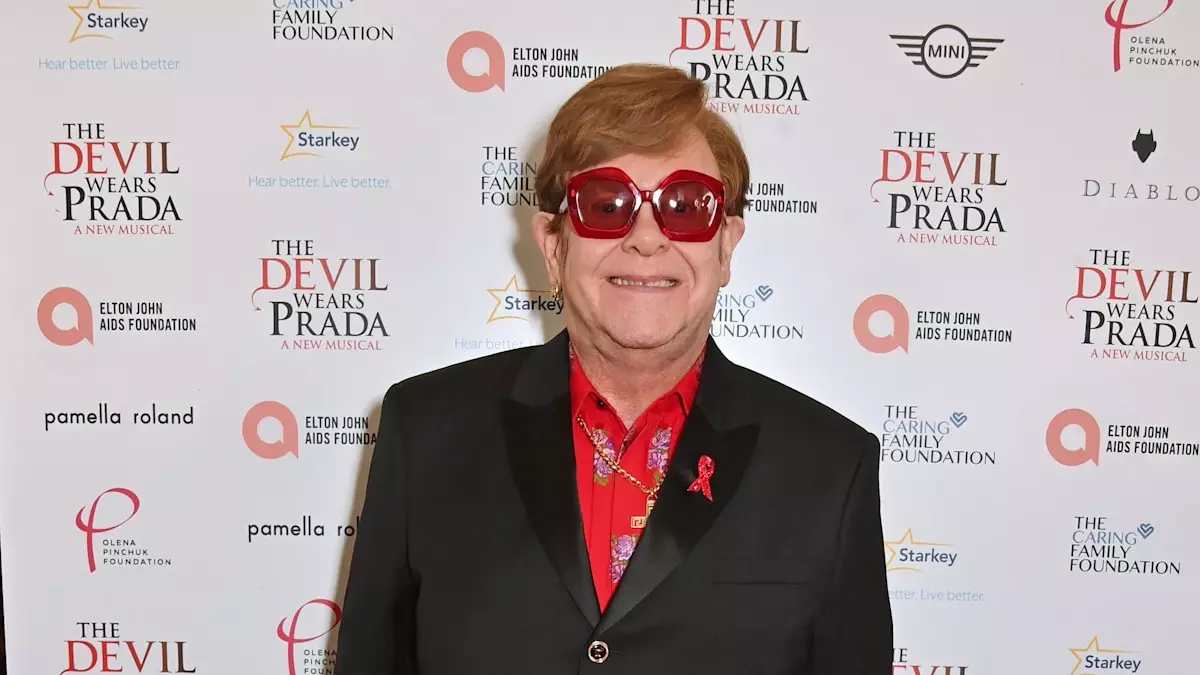Sir Elton John, the musical legend who has touched countless lives through his artistry, recently shared a deeply personal struggle that marks a significant turning point in his life. During a red carpet event for the London premiere of *The Devil Wears Prada: The Musical*, the 77-year-old revealed he has completely lost his eyesight, a disclosure that underscores the harrowing challenges he now faces. This news, though heartbreaking, was accompanied by the resilient and optimistic disposition that fans have come to associate with Elton. The support of his husband, David Furnish, has been a steadfast source of strength during this tumultuous time.
Elton addressed the audience at the Dominion Theatre, candidly sharing, “As some of you may know, I have had issues, and now I have lost my sight.” His honesty resonated with many, exemplifying how vulnerability can coexist with positivity. While he may not have had the luxury of sight to enjoy the performance fully, he eloquently expressed his appreciation for the auditory experience, stating, “I haven’t been able to see the performance, but I have enjoyed it.” This profound yet simple acknowledgment not only earned him applause but also showcased his unwavering passion for music, transcending the restrictions imposed by his condition.
At the center of Elton’s current journey is his husband, David Furnish, whose presence and unwavering support have been pivotal. Elton’s heartfelt gratitude towards David shone through when he remarked, “To my husband, who’s been my rock.” Such statements illustrate the importance of having a solid support system in facing life’s adversities. Relationships can serve as pillars during trying times, and for Elton, David has been a balm for his emotional and psychological wounds as he navigates this new reality. Their partnership emphasizes the profound connection that can exist between individuals, especially when confronted with challenges such as those faced by Elton.
Elton’s recent health struggles began in the summer with a severe eye infection, resulting in the loss of vision in his right eye and significant limitations on his life and career. In candid discussions about his documentary *Never Too Late*, he revealed how losing his eyesight has affected not just his daily life but also his creative endeavors. Notably, he expressed distress over the difficulties he now faces in the studio, lamenting, “I don’t know. I can’t see a lyric for a start.” Such reflections highlight the complex interplay between creativity and physical capability, illustrating that even giants of the music industry are not immune to life’s unexpected tribulations.
What’s remarkable about Elton John’s narrative is the inherent optimism that permeates his words despite the challenges he faces. He proclaimed, “I’m so lucky, I’m the luckiest man in the world,” a statement that embodies resilience and gratitude. Rather than succumbing to despair, Elton chooses to celebrate the positives in life: his family, his career, and his accomplishments. This perspective serves as an inspiration for many, reminding us that even in our darkest moments, there can be a light of hope radiating from our experiences.
Throughout his career, Elton has faced numerous health-related issues, including knee replacements and surgeries for injuries. These experiences reveal not just his physical resilience but also his emotional tenacity. The music legend gave a heartfelt Instagram update on his recovery, emphasizing a slow yet positive healing process. This narrative of healing embodies the broader human experience, where setbacks exist alongside recovery and hope.
As Elton reflects on his life, he acknowledges the inevitable contemplation of mortality, particularly as he enters the later stages of his journey. In moments of profound clarity captured in *Never Too Late*, he questions what will become of his legacy, pondering, “I wonder what is going to happen to all of this stuff when I finish.” Such introspective thoughts offer a glimpse into the mind of an artist who has achieved so much but grapples with the temporal nature of life.
Elton’s transparency about aging and his thoughts on life and death echo sentiments many share as they grow older. He stated, “You think about that more when you get to my age.” His honesty serves as an important reminder – that even the icons we idolize face their own uncertainties and fears, showcasing the universality of these contemplations.
Despite the potential for retirement from performing to arise from this new chapter, Elton has made it clear that his creative spirit remains undeterred. “I don’t have to work after this… but travelling takes so much out of you,” he mentioned. This affirmation of his dedication to creativity, even in limited capacity, underscores a vital lesson: resilience does not imply the absence of struggle but rather the determination to continue, adapt, and thrive.
Sir Elton John’s life is a testament to the triumph of the human spirit. He represents not just the accomplishment of a prolific career but also serves as a symbol of gratitude and tenacity in the face of adversity. As he embraces this new chapter in life, marked by challenges and the unwavering support of loved ones, his journey remains an inspiring narrative of hope, reminding us all of the beauty in facing life’s unpredictable turns with grace.

